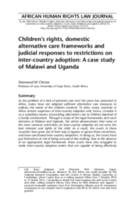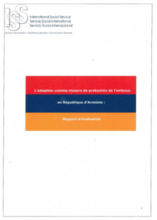Displaying 421 - 430 of 660
Child Trends recently released three sets of child welfare fact sheets detailing child maltreatment, foster care, and adoption statistics from the United States for federal fiscal year (FFY) 2013. Each set of 52 fact sheets uses state and national data to tell a story about the U.S.'s most vulnerable children and youth, a story that varies dramatically by state.
This study examined stress, coping and psychological adjustment of 68 children, aged 8–12, who were internationally adopted to Spain.
This video by Child's i Foundation in Uganda document's the journey of a little girl, Praise, from being abandoned to being placed into to a permanent family. The video shows the tracing process and temporary placement with a foster car
Through a study of the legal frameworks and court decisions of Malawi and Uganda, this article demonstrates that some of the most common restrictions on inter-country adoption do not serve the best interests and rights of the child.
This article from the Case Western Reserve Law Review journal in the United States presents a proposal to reduce, and ultimately eliminate, the rehoming of adopted children in the United States.
This chapter discusses the practice of child circulation in Ghana.
Ce rapport est basé sur une évaluation indépendante du SSI réalisée en 2015, sur le mandat de l'UNICEF Arménie et du Ministère de la Justice Arménien. Il s’inscrit dans le cadre d’un projet de réforme lancé par les autorités arméniennes en vue d’améliorer le système de protection de l’enfance et de mieux intégrer les principes de la Convention de La Haye dans la pratique de l’adoption.
This article studies different medical and psychological models of orphanhood and the effects these models have on the resiliency of orphanhood.
As part of phase one of the development of the Martin James Foundation's Asia Care Network, comprehensive studies of the care system in each country were conducted to highlight the need for developing alternative care systems across South-East Asia. This case study highlights the relevant data from the Philippines.
This report presents data on the total number of adoptions in the United States as well as the number of public, intercountry, and other adoptions covering 2008 to 2012.




